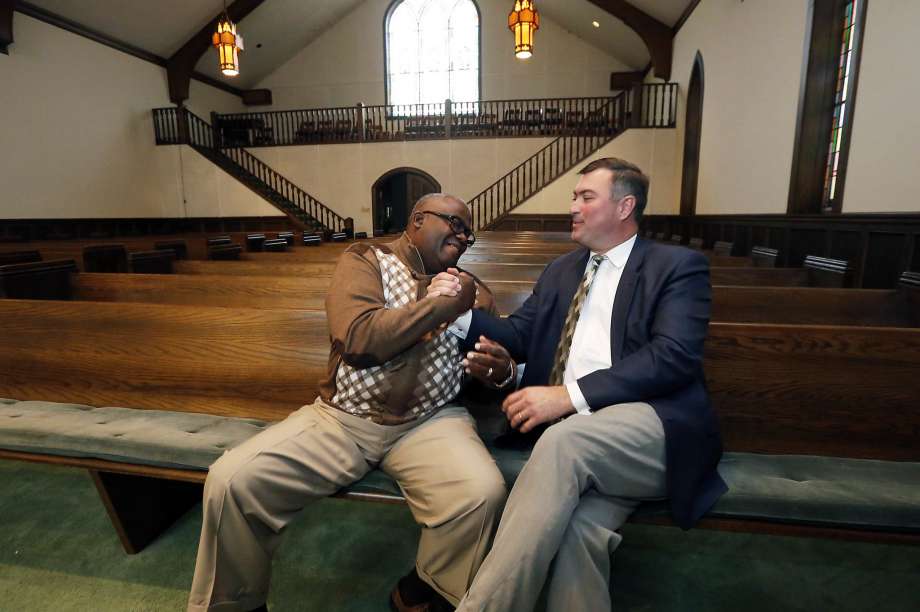
By Emily Wagster Pettus
Associated Press

GREENVILLE, Miss. (AP) – Back in the 1960s, the Rev. Martin Luther King Jr. observed that Sunday morning is the most segregated time of the week in America, a fact that remains true in many communities today.
But three weeks after their church in the Mississippi Delta was mostly destroyed by arson and someone spray-painted “Vote Trump” outside, an African-American congregation has been welcomed into the church of its white neighbors.
The bishop of Hopewell Missionary Baptist Church, Clarence Green, says the generosity of First Baptist Church of Greenville demonstrates that “unlimited love” transcends social barriers. And his host, First Baptist’s senior pastor James Nichols, says their brothers and sisters in Christ are welcome to stay as long as they need a home.
The Hopewell congregation, about 200 strong, is holding services a mile away at 600-member First Baptist. The guests are using the chapel, a space with dark wooden pews and bright stained-glass windows where small weddings and funerals are usually held. It’s on the downtown campus of First Baptist, a few steps from the larger main sanctuary.
Nichols says he offered to have the Hopewell flock worship with his members in shared services, but Green hopes his congregation can maintain its identity and sense of community while their home church is rebuilt.
“They opened their doors to us to stay as long as we want and do whatever we need there,” Green said. “What God is doing – it’s not about race, creed or color…. The God we serve is neither black nor white, Jew nor gentile.”
Greenville is bordered on the west by the Mississippi River and an oxbow lake, while cotton fields, brown and dormant after the fall harvest, stretch north, east and south from the edge of town. Once a bustling center of commerce, the compact downtown, with brick streets, is now dotted by several empty buildings. About 78 percent of its 32,100 residents are black.
While it’s common to see people of different racial backgrounds eating lunch together, local residents say the congregations at most churches remain clearly identifiable by race.
An arson investigation continues with no arrests made in the Nov. 1 burning of Hopewell, whose congregation was founded in 1905 in the heart of an African-American neighborhood. While some walls survived the fire, the empty windows are boarded up and the beige brick structure will likely be razed. Reconstruction could take months.
Nichols said he’s constantly preaching the Golden Rule – do unto others as you would have others do unto you – so it seemed only natural to open First Baptist’s doors to their neighbors.
“If it had been our church that burned, somebody would have reached out to do the same for us,” Nichols said.
So, now, two worship services take place at First Baptist each Sunday. Because Green is pastor of multiple churches, the Hopewell services are held at 8 a.m. on some Sundays, and 11 a.m. on others.
Nichols said some of his members have been stopping by the Hopewell service to sing and pray on the way to or from their own late-morning services. Nichols said he has heard “zero negativity” about opening the church to an African-American congregation.
“That probably would not have been the case 30 years ago,” Nichols said. “It’s been refreshing to see a new chapter in our American culture. It’s not just a Greenville thing.”
Green nodded.
“Forty years ago, it was unheard of for a black congregation and a white congregation to worship together,” Green said. “A wall of hatred is being torn down through the spirit of love.”
Greenville is in Washington County, a traditional Democratic stronghold in a solidly Republican state. In the Nov. 8 presidential election, Republican Donald Trump easily carried Mississippi, but Democrat Hillary Clinton received more than twice the vote of Trump in Washington County – 11,380 for Clinton to 5,244 for Trump.
Green said that as a Christian, he believes in “ultimate forgiveness.” On the very night his church burned, he forgave the perpetrators without even knowing their names. That said, he won’t stand in the way if someone is eventually charged and prosecuted.
“I can’t entertain the stuff that was painted on the building, even though I know it was from someone else’s hate,” Green said. “I can’t lower myself to somebody else’s hate.”



